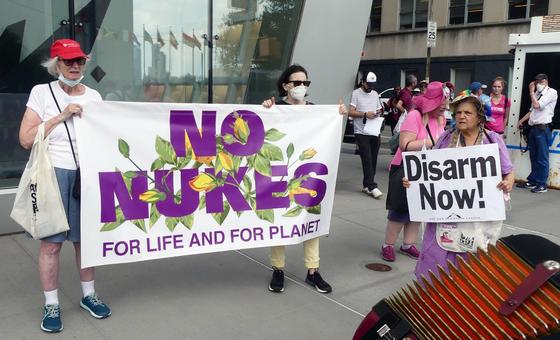
The Conference, which was established with the primary goal of fostering cooperation for mutual disarmament, has faced significant challenges in recent times.
“Something looks wrong if a disarmament conference leads to no meaningful disarmament, year after year,” Secretary-General António Guterres said.
“Humanity needs the Conference on Disarmament to work successfully. The paralysis and deadlock that have come to define it is something that is not acceptable,” he added.
Humanity needs the Conference on Disarmament to work successfully
– Secretary-General Guterres
Proud history
Mr. Guterres recalled the Conference’s historic role in drafting key agreements such as the Treaty on the Non-Proliferation of Nuclear Weapons (NPT) and the Comprehensive Nuclear-Test-Ban Treaty (CTBT).
“These victories for peace were hard-fought and hard-won,” he said, stressing that they were not miracles but a result of countries working together in cooperation.
However, with global trust “falling apart” and geopolitical divides creating a “total deadlock”, the Conference must be urgently reformed, he stressed.
‘Inclusive diplomacy’
In response, the Secretary-General highlighted the UN’s proposed New Agenda for Peace, which, among other priorities, places prevention and disarmament at the forefront of the global peace and security architecture.
Mr. Guterres urged the Conference not to contribute to the prevailing cynicism around multilateral action but to actively engage in finding solutions that can propel humanity forward.
“Despite the current diplomatic deadlock, the central premise behind this Conference remains as vital as ever,” he said.
“The most effective disarmament tool is inclusive diplomacy. We need that diplomacy now – urgently,” he added.
The Conference on Disarmament
Established in 1979, the Conference on Disarmament is the world’s only multilateral forum for disarmament negotiations.
Originating in previous Geneva-based committees, it has played a key role in shaping major arms limitation pacts such as the Non-Proliferation of Nuclear Weapons (NPT); the convention on prohibition and destruction of biological weapons, the convention on the prohibition and destruction of chemical weapons, and Comprehensive Nuclear-Test-Ban Treaty (CTBT).
Consisting of 65 member States, including the five declared NPT States with nuclear capability (China, France, Russia, the United Kingdom, and the United States), the Conference also invites non-members to participate in its work.



